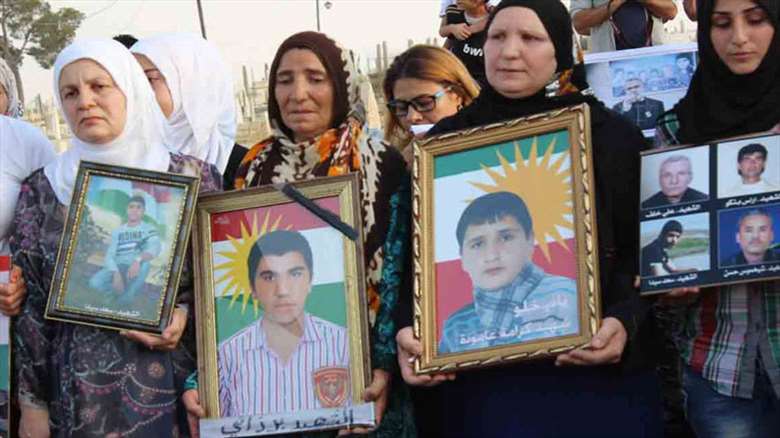YPG apologizes for 2013 protester killing incident in northeast Syria

ERBIL (Kurdistan 24) – In ongoing efforts to further improve relations among Syrian Kurdish parties that have often seen one another as rivals, the People’s Protection Units (YPG) on Saturday apologized for an incident six years earlier in the town of Amude in which the group's fighters killed six protesters.
In a video statement, YPG spokesperson Nouri Mahmoud described the violent outbreak that took place on June 27-28, 2013, as “a catastrophe,” stating that “such incidents should not be repeated in the history of Rojava (Syrian Kurdistan) and all Kurds.”
“As the General Command of the People’s Protection Units, we consider ourselves responsible for this unfortunate occurrence.”
Mahmoud added that the group's leadership “admits” a major error had “followed an encounter between one of our units, which was returning from the frontlines, and a group of demonstrators gathering in front of the Asayish headquarters demanding the release of young activists—as a result, innocent people lost their lives.”
“As the YPG’s General Command, we express our deep grief and sorrow over the accident.”
“Moreover, we are ready to do all that is required to heal this wound of the Rojava revolution, we offer our apologies, and we shall compensate, materially and morally, for the families of the martyrs in Amude city.”
“We have sacrificed greatly in order to secure reconciliation, peace, and safety for our people—and yet that is our duty and our people’s right upon us. We are ready to do all that is needed to guarantee the protection and security of our people.”
Reporting the incident in 2014, the New York-based Human Rights Watch (HRW) claimed that the YPG had used “excessive force against anti-PYD demonstrators.” The Democratic Union Party (PYD) is the political wing of the YPG.
The HRW report also alleged that “YPG forces came under fire from people in the crowd, killing a YPG soldier named Sabri Gulo, which provoked the YPG to respond with live fire from their positions on the main road.”
However, participants in the protest interviewed by HRW denied that they were armed and claimed the YPG responded with gunfire without reason.
At the time, the US State Department condemned the YPG’s deadly response and the arrest of 90 activists after the incident.
“There is no justification for these attacks or the PYD’s attempts to repress freedoms of expression and assembly by silencing those who peacefully advocate for democracy and human rights,” said Patrick Ventrell, a Director for the Office of Press Relations at the State Department at the time.
The General Command of the Syrian Democratic Forces (SDF) on Friday announced that a committee was established to reconcile the YPG and relatives of the killed protestors. YPG is the chief component of the SDF, the military alliance backed by the US-led coalition against the so-called Islamic State in Syria.
In his statement on the issue, SDF Commander-in-Chief Mazloum Abdi affirmed “his readiness to do everything possible to heal this wound in the history of the Rojava Revolution and to offer apologies and moral and material compensation to the affected and the families of the martyrs of our people in the city of Amude.”
Ebdulqadir Wetê, a member of the SDF’s Reconciliation Committee, told Kurdistan 24 that they were invited by Commander Abdi to resolve the Amude issue.
“We went to meet him, and we told him that you must apologize to the people of Amude and the families of the martyrs, and compensate for those who were martyred as well as their families, and record them as ‘martyrs.’ He [Mazloum Abdi] accepted all of the terms.”
“We then met with the Local Council in Amude and the [Kurdish] National Council in Qamishli. We explained the initiative to them; they were very welcoming since the terms covered all the noted demands.” The Kurdish National Council (KNC) is another Syrian political entity that has had historical differences with the PYD.
“Not only the victim families but everyone in Amude was affected by the 2013 incident. Nothing alike had happened in Amude before. The victims were the sons of the Amude families who were martyred. The issue was more sensitive since Kurds were killed by Kurds – if the [Syrian] government was behind the deaths, it might not have been as sensitive as it is now,” Wetê concluded.
The PYD and the KNC, the two major factions among Syrian Kurdish parties, renewed negotiations in early November to resolve long-standing disputes after Turkey’s cross-border offensive in northern Syria in October. On June 17, the two parties reached an initial understanding to continue talks based on the 2014 Duhok agreement.
Related Article: Syrian Kurdish opposition party says no final agreement on Kurdish unity yet
“Both the 2013 shooting of three pro-KNC protesters and the 2020 apology from YPG are unusual incidents, with the relationship between the democratic-confederalist Administration and Kurdish-nationalist opposition in NES typically marked by frosty relations rather than open conflict,” Thomas McClure, a Syria-based researcher at the Rojava Information Center, told Kurdistan 24.
“That YPG has chosen to apologise for the incident now is another goodwill gesture in the ongoing detente between these two major forces in local politics. KNC has been accused of dragging its heels in the crucial negotiations while citing a handful of historic incidents, while the PYD-led Administration has been accused of seeking to gloss over historic rights violations against opposition activists.”
“Along with the Administration taking steps to release a handful of imprisoned KNC activists and allowing KNC to open unregistered offices in NES (Northeast Syria), this apology marks another baby step along the long road the two parties must still travel toward a political consensus.”
Editing by Khrush Najari
